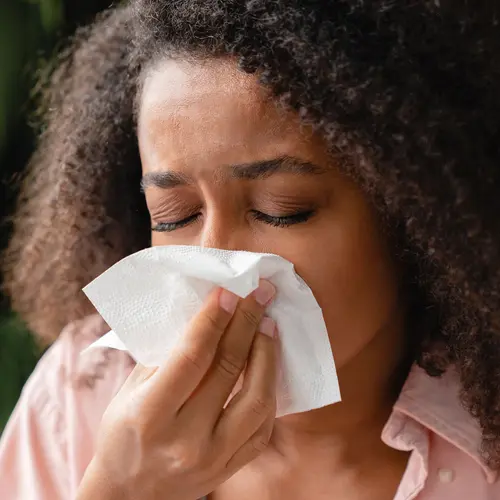You're already doing your best to avoid pollen, but you still might need medication to ease your seasonal allergies. A few types can help.
Check with your doctor before you start taking any of these medicines, even if you don't need a prescription. That way, your doctor can make sure you're taking what you need and watch for any side effects.
Nasal Steroids
These are drugs you spray into your nose. They are the first choice of treatment for allergic rhinitis. They relieve congestion, a runny or itchy nose, sneezing, and other symptoms. Nasal steroids are often the first treatment doctors recommend.
Some steroid sprays require a doctor’s prescription, but three of them, budesonide (Rhinocort Allergy), fluticasone (Flonase), and triamcinolone (Nasacort Allergy 24HR), do not. It’s best to start using them before pollen season begins and to keep taking them as long as it lasts. It may take up to a week before your symptoms get better.
Steroids you take by mouth (oral steroids) are only used in rare cases to treat nasal allergies.
Antihistamines
These drugs work against the chemical histamine. Your body makes histamine during an allergic reaction, and it causes the symptoms that make you miserable.
Antihistamines are available in pills and nasal sprays. The pills target itching, sneezing, and runny nose. The nasal sprays work on congestion, an itchy or runny nose, and postnasal drip.
Some over-the-counter pills can fight your symptoms for longer. Be careful, as they can also make you drowsy:
Others can make you feel drowsy, such as:
- Brompheniramine (Dimetapp Allergy, Nasahist B)
- Chlorpheniramine (Chlor-Trimeton)
- Clemastine (Tavist)
- Diphenhydramine (Benadryl)
You’ll need a prescription to get other types of antihistamines in a nasal spray, including
- Azelastine (Astelin)
- Azelastine/Fluticasone (Dymista). This combines an antihistamine with a nasal steroid.
- Olopatadine (Patanase)
Decongestants
These drugs unclog your stuffy nose. You can take some types as pills or liquids, like phenylephrine and pseudoephedrine. Others come in a nasal spray, like oxymetazoline and phenylephrine.
Don't use the decongestant nasal sprays for more than 3 days in a row, or you might get rebound congestion, which means you get congested all over again.
Remember that decongestants can also cause problems, including increased heart rate and blood pressure. If you have heart problems or high blood pressure, you shouldn’t take them. If you have a prostate problem that makes it hard to urinate, these drugs can make it worse. It’s a good idea to talk to your doctor first to see if a decongestant will work for you.
Other Medications and Combinations
Cromolyn sodium (NasalCrom) is a nasal spray that keeps certain cells in the body called mast cells from releasing chemicals that cause allergy symptoms. It's available without a prescription and helps a runny/itchy nose, sneezing, and congestion.
Nasal ipratropium is a prescription nasal spray that can help if you have a runny nose because of your allergies.
Some products include more than one kind of drug. Allegra-D, Claritin-D, and Zyrtec-D have both an antihistamine and the decongestant pseudoephedrine.
Allergy Shots and Other Immunotherapy
You call them allergy shots. Your doctor calls it "immunotherapy." By either name, the goal is the same: Retrain your immune system so it doesn't go into allergy mode.
When you get allergy shots, your doctor gives you small, gradually increasing amounts of the pollens that are causing your symptoms. Over time, your body builds up a resistance to them. The shots are a long-term commitment, likely taking 3 to 5 years. After that, your doctor will see if you still need them.
Instead of getting shots at the doctor’s office, there are also under-the-tongue tablets that you can take at home. The FDA has approved three of these products: Grastek, Oralair, and Ragwitek. They work the same way as shots. The goal is to boost your tolerance of allergy triggers.
The tablets can cause an allergic reaction in some people, so you will need to take your first one at your doctor’s office to make sure it’s safe for you. Even if you don’t have a reaction, you may feel itching or burning in your mouth or lips or have stomach troubles. These problems usually go away after a few days.

